Hamas Military Chief's Links To Iran's Soleimani Revealed
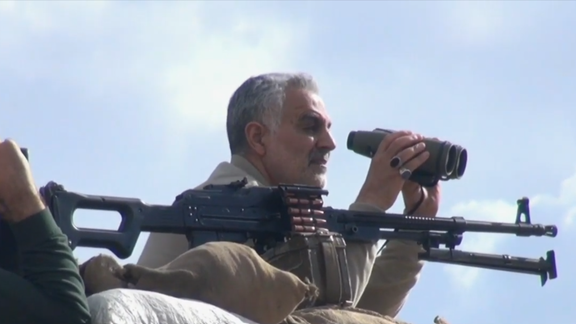
An Iranian lawmaker has raised the close ties between Mohammed Deif, Hamas' military chief, and former IRGC-Quds force commander Qassem Soleimani.

An Iranian lawmaker has raised the close ties between Mohammed Deif, Hamas' military chief, and former IRGC-Quds force commander Qassem Soleimani.
Esmail Kowsari, an ultraconservative and former IRGC general said that Deif, the chief of the Izz ad-Din al-Qassam Brigades, Hamas' military wing, and Soleimani "collaborated on the planning of numerous operations over the years”.
The Hamas assault on October 7 saw the Iran-backed proxy launch over 3,000 rockets at Israel before invading by land, air and sea in the deadliest single day for Jews since the Holocaust.
At least 1,400 mostly civilians were killed and at least 241 hostages taken to Gaza, including children and the elderly. In retaliation, Israel has since launched its most comprehensive invasion of Gaza in decades, resulting in the deaths of thousands of Palestinians as the Jewish state vows to rid the strip of Hamas.
Before his assassination by the US in 2020, Islamic Revolution Guards Corps commander Qassem Soleimani allegedly wrote to Deif that Tehran would continue supporting Palestine "despite all pressures and sanctions.” According to Hezbollah-affiliated al-Mayadeen news channel at the time, Soleimani said "the Islamic Republic of Iran will not abandon Palestine and the Palestinian people".
Deif, one of the architects of the horrific attacks, along with Yahya Sinwar, Hamas' ruler in the Gaza Strip, was added to the American list of Specially Designated Global Terrorists in 2015.
Iran has expressed its unwavering support for Hamas and condemned the US support of Israel. Iranian backed proxies have since launched dozens of attacks on US facilities in the Middle East, while simultaneously attacking Israel from its borders and beyond.
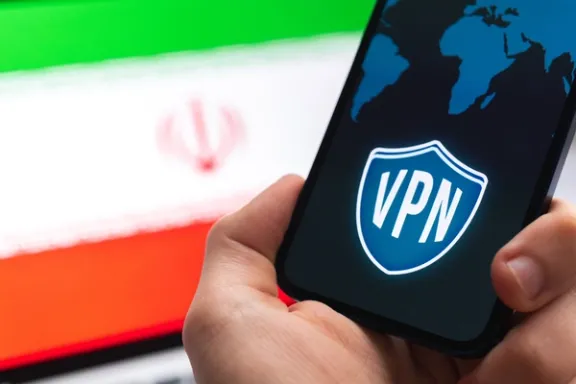
An Iranian MP claims there is a link between those lobbying for internet censorship and the companies producing censorship circumvention tools like VPNs.
Javad Nikbin, a member of the Cultural committee of the Iranian Parliament, made the connection, which also followed recent comments by another parliament member, Jalal Rashidi Kouchi, who estimated that the financial turnover of VPN sellers in Iran amounts to approximately 800 million to 1 billion dollars annually.
Additionally, another lawmaker, Mohammad Hassan Asafari, has previously alluded to the infiltration of government organizations by these VPN companies.
Since September 2022, Iran has witnessed an increase in censorship measures, often accompanied by internet shutdowns, in response to protests. It was anticipated that with the subsiding of these protests, popular messaging apps used by citizens would have their filters lifted. However, this did not occur.
Instead, the market for VPNs and circumvention tools designed to bypass filtering has thrived. According to parliament members, the income generated by the sellers has skyrocketed to hundreds of millions of dollars each year.
Reports from the Ministry of Communications in 2019 indicated that at least 28 domestic companies were engaged in the business of selling VPNs. Despite the awareness of judicial and security authorities regarding this matter, no action has been taken against these activities. The revelation of these connections between filtering advocates and VPN producers raises concerns about the implications and potential for further regulatory action in Iran's online space.
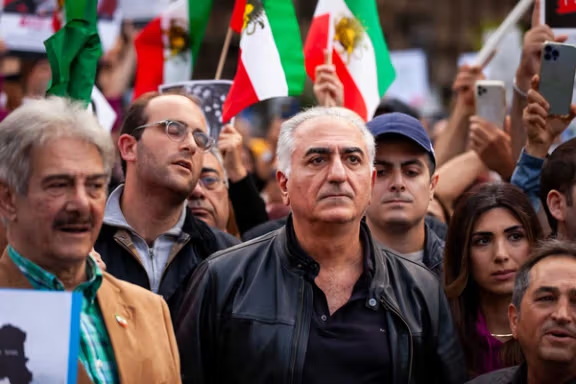
An Iranian Revolutionary Guard official revealed that prisoners expressed a desire for the return of the exiled prince Reza Pahlavi to Iran.
The surprising statement by Yadollah Javani, the political deputy of the IRGC came during an organizational meeting held on Tuesday night in East Azerbaijan province.
Javani raised concerns about the use of terms like "conquering the streets," "a new revolution," and other similar phrases by opposition groups.
Notably, this is the first instance of a senior official within the IRGC publicly acknowledging support for the Pahlavi regime and the desire for Reza Pahlavi's return to Iran during a public speech. The exiled prince is widely considered the most viable alternative to the Islamic regime and remains a positive figure on the world stage.
The regime's smear campaign against the Pahlavis aligns with its evolving tactics in the realm of 'soft warfare,' as coined by Iran's Supreme Leader Ali Khamenei. In recent times, Khamenei has employed this term to describe endeavors in the media and on social platforms, aimed at presenting alternative interpretations in an attempt to portray the regime more favorably than its actual nature.

A Pentagon official has told Iran International that Iran's proxies have attacked US forces in the Middle East 40 times since the Israel-Hamas war began last month.
The attacks have taken place in Iraq (22 times) and Syria (18 times), the official said.
On Monday, the Pentagon announced that in the past month, at least 46 American troops have been injured in attacks by Iran-backed militias, who seem to have grown impervious to recurring threats of retaliation by US officials.
And it’s not hard to see why.
Top Biden spokesman John Kirby confirmed Monday that there have been no additional strikes against Iran-backed proxies in the past couple of weeks despite continued attacks on bases housing American troops.
Kirby emphasized that none of the attacks on US forces have been “effective” and “in many cases have been thwarted,” implying that retaliation has been unnecessary.
But the view from the ground seems to be different.
"We're in the bunkers about every other day. These f**kers will eventually get lucky with one of these drones and kill a lot of people."
This is part of a conversation James Hasson, an attorney and an Afghanistan veteran, says he’s had with a “buddy” serving in the region.
"We aren't doing shit in response… we bombed a few empty shacks in Syria."
Hasson says the US troops find it hard to fathom the Biden administration's “total inertia in response to the threat level.” He quotes his friend as saying, it’s “sheer luck” that no one has been killed so far.
Biden critics say his lenient approach towards the Islamic Republic has emboldened not just the regime but its proxies in the region. Armed militant groups backed (and often guided) by the Islamic Republic are targeting US troops almost daily.
“If you want to strangle Iran, you cut off their oil,” said Republican Senator John Kennedy on Monday. “The Biden admin is choosing not to do that, and now they wonder why Iran’s proxies thought they could get away with attacking Israel and, by extension, America.”
Many US lawmakers have become more vocal about Biden’s Iran policy since October 7, when Hamas forces attacked border regions of Israel, killing at least 1,400 and taking at least 200 hostage.
In response, Israel has been bombarding targets in Gaza relentlessly and has moved in to take the northern part of the enclave, which is the main bastion of Hamas. Thousands of Palestinian have been killed and injured, although there are no reliable and independent numbers.
The attack on Israel has galvanized US lawmakers against the Islamic Republic, which many see as the brains and the hands behind Hamas. Several legislative measures have been introduced in the past few weeks with the sole or primary aim of punishing the Iranian regime.
One such bill is No Funds for Iranian Terrorism Act, introduced by Michael McCaul, Chairman of the House foreign affairs committee.
The bill imposes new sanctions on the “$6 billion of Iranian funds transferred to Qatar as part of the 2023 Hostage Deal” McCaul said in his statement.
“It will be irresponsible to allow another cent to flow to Iran. So that’s why my bill ensures the funds remain permanently off-limits to the Iranian regime.”
Another bill was introduced by Senators Marco Rubio and Jim Risch.
The End Iranian Terror (End IT) Act “requires the creation of a strategy to counter China’s evasion of sanctions imposed by the United States with respect to Iran,” according to a press release by the Senate Foreign Relations Committee.
“Iran has earned $80B in oil revenue, mostly from Chinese purchases. It uses these funds to supercharge its terrorist proxies, like Hamas,” Senator Risch wrote on his X account. “My bill directs the Biden Admin to enforce Iran oil sanctions & start taking action to starve the regime of resources.”
Senator Risch is also a cosponsor of the Stop Harboring Iranian Petroleum (SHIP) Act, which, according to a press release Monday, “would direct new sanctions on illicit purchases of Iranian oil and hold the regime’s enablers accountable.”
Reports emerged Monday that the Biden administration has sent strong messages to Iran and Hezbollah via Turkey that the US will intervene immediately if they attack Israel.
The Pentagon announcement of 40 attacks on American forces in a month raises serious questions about the seriousness of these treats.
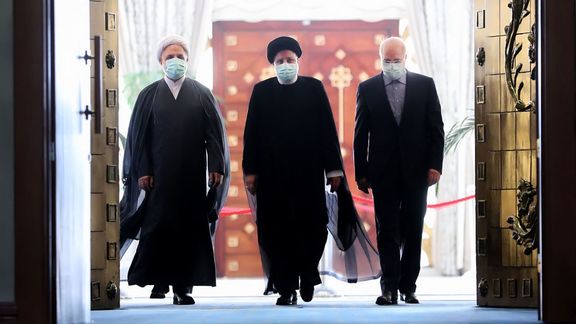
Iranian President Ebrahim Raisi and his ultraconservative allies are likely to present three different lists of candidates for the parliamentary elections in March.
This move seems aimed at creating an overwhelming propaganda push to secure a parliament dominated by Raisi's supporters, ensuring minimal opposition to their complete takeover of the executive and legislative powers. Some social media reports also suggest an effort to replace Judiciary Chief Gholamhossein Mohseni Ejei with an ultraconservative figure, further consolidating power.
A “political purification” push has already begun, with all regime loyalists outside the circle of hardliners being purged from managerial and even teaching positions.
Abdolreza Davari, an aide to former President Mahmoud Ahmadinejad has alleged that Iranian state television plays a pivotal role in this "political purification" project, with Ejei not immune to the attempts to eliminate anyone not closely aligned with the ultraconservative Paydari Party.
Meanwhile, Khabar Online website in Tehran revealed that the Raisi administration is preparing three lists of ultraconservative candidates to overwhelm voters. The website said that the Strategic Network of Friends of Revolution [Persian acronym SHARIAN] led by Roads and Urban Planning Minister Mehrdad Bazrpash will be the leading group among the three.
While Raisi and his associates deny any concerted efforts to influence the upcoming elections, political figures linked to Paydari confirm re-branding and renaming of ultraconservative groups in preparation for the elections. The deliberate tactic is aimed at confusing voters, who may have lost trust in ultraconservative politicians over the past four years due to inefficiency and opposition to nationwide protests in 2022.
Nonetheless, political figures close to Paydari, such as Esmail Kowsari have confirmed that groups linked to Paydari have been re-branding ahead of the elections. Other reports have indicated that re-branding and name changes among ultraconservative groups are likely to confuse the voters.
Ultraconservative leaders know that their likeminded politicians have lost the nation's trust in the course of the past four years both in terms of the inefficiency of their representatives in the parliament and in the government and as a result of their violent reaction to the nationwide protests that shook Iran in 2022.
Ultraconservative politicians may be also hoping that the same groups under different names can be attractive for voters particularly if they come up with generous pledges to voters, although unmet promises about building four million homes, reducing employment and controlling inflation in the past two years have made people numb to any rosy promises.
Politicians and political analysts in Tehran do not hide their concern about yet another drop in election turnout after the disgraceful low turnouts in the parliamentary elections of 2020 and presidential elections of 2021, the lowest since 1979. In some districts just around 20 percent of voters cast ballots. However, Iran's reformists and moderates who were barred from running in those elections and are likely to be barred again in March, maintain that the ultraconservatives favor a low-turnout election as it would guarantee their win despite the embarrassment for the regime.
According to Khabar Online, politicians in Tehran have said that Paydari will coordinate its lists with Raisi. Moderate conservatives have already nicknamed groups such as SHARIAN as "Raisi's proxy groups." Salman Zakeri, a lawmaker from Urmia in northwestern Iran, says the idea of proxy groups is also meant to cover up the discords among the ultraconservative groups. He argued, "It is strange that they have a unity Council, and still they are divided into at least three groups."
In another development, while all of these tactics ahead of the elections are part of the campaign toward political purification, Expediency Council member Mohammad Sadr is adamant that "The idea of political purification has been wrong from the start." He stated, "When we talk about different shades of ultraconservative, it proves that there is no consolidated ultraconservative government."
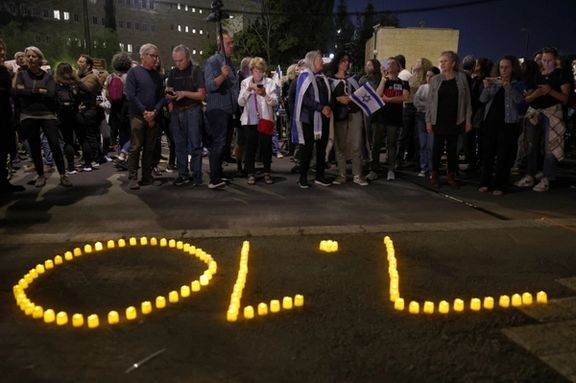
The Thai government is currently in discussions with Iran and Qatar to secure the release of 23 hostages held in Gaza, as reported by Hebrew media sources.
Thai citizens were killed and abducted during an assault on southern Israeli communities in a terror raid by Hamas on October 7. Foreign workers, many from Thailand, have long been employed in Israeli farms bordering Gaza, contributing to various agricultural tasks.
Thai Prime Minister Srettha Thavisin has assured that the hostages in Gaza are safe and will soon be freed. However, details regarding the negotiations and the mediators involved have not been disclosed.
Israeli Channel 12 reported on Monday that the Thai government recently made a donation of 3 million baht, equivalent to approximately $85,000, to the United Nations' agency for Palestinian refugees. Questions have risen regarding whether the donation is linked to the ongoing negotiations.
Channel 12 has also revealed that Iran is playing a pivotal role in the negotiations for the release of the captured Thai nationals. If an agreement is reached, the captives may be transferred to Egypt and then to Tehran before being repatriated to Thailand.
Moreover, Channel 12 showcased a photograph of a Thai delegation, led by the country's deputy prime minister, meeting in Tehran with Iran's Foreign Minister Hossein Amir-Abdollahian a few days ago.
During the October 7 onslaught, which marked the beginning of the Israel-Hamas war, 32 Thai citizens were killed, and 23 were abducted, according to official Thai government figures.
The toll from the attack resulted in the loss of approximately 1,400 lives, with the majority being civilians, and over 240 individuals kidnapped.